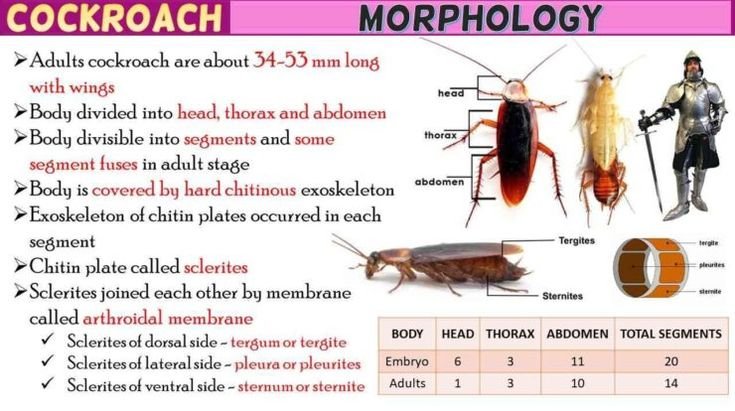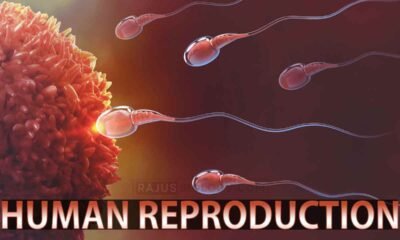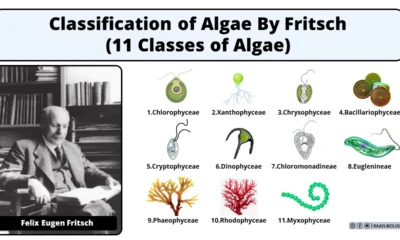Blog
Cockroach Morphology Short Notes | Free Biology Notes

In this article we will discuss about the cockroach morphology
Cockroach Morphology
- Cockroaches are brown or black bodied animals
- Inhabiting the unhygienic and damp places
- Cockroaches are nocturnal, omnivorous, cursorial and exhibit cannibalism
- Cockroach can run 130 cm/sec
- They also transmit various types of bacterial diseases
- Adults cockroach are about 34-53 mm long with wings
- Body divided into head, thorax and abdomen
- Body divisible into segments and some segment fuses in adult stage
- Body is covered by hard chitinous exoskeleton
- Exoskeleton of chitin plates occurred in each segment
- Chitin plate called sclerites
- Sclerites joined each other by membrane called arthroidal membrane
- Sclerites of dorsal side – tergum or tergite
- Sclerites of lateral side – pleura or pleurites
- Sclerites of ventral side – sternum or sternite
Head
- Head is triangular and hypognathous
- Head is formed by fusion of six segments
- Sclerites of the head joined fully and form head capsule
- The head bears a pair of compound eye, a pair of antennae.
- Each compound eye made up of 2000 units called ommatidia
- Antennae have sensory receptors
- Head bears appendages meant for biting and chewing types of mouth parts
- Mouth situated in the anterior side of head which is surrounded by mouth parts
Mouth Parts Of Cockroach
A labrum (upper lip)
- Broad and roughly rectangular shaped structure
- Bear chemoreceptor on inner side
A pair of mandibles
- Pair of hard, strong, large, dark coloured structures found one on either side
- They bear pointed teeth like structure and crush the food present in between them
A pair of maxillae
- Lie outside and behind the mandibles & made up of five segment
- Function: cockroach pickup its food and put it in preoral cavity for chewing.
- Maxillary palps also used as brush to clean antenna and wing.
A labium (lower lip)
- Labium is formed by the fusion of the second pair of maxillae
- It forms the broad median lower lip and has a pair of 3-segmented labial palps on either side which is bear taste receptors
Hypopharynx
- A median flexible lobe acting as tongue
- It bears several sensory setae
Thorax
- Thorax is the middle part of the body
- Thorax consists of three segments – prothorax, mesothorax and metathorax.
- Each thoracic segment bears a pair of walking legs
- Thorax has two pairs of wings on the dorsolateral side.
- Each leg is made by 5 segments
- 1st podomere is coxa: broad and attached to the thorax. It is the most swollen segment
- 2nd podomere is trochanter: It gives viability for movement of leg
- 3rd podomere is femur: strongest part of the leg. It shows bristles.
- 4th podomere is tibia: longest part of the leg. It also bears bristles
- 5th podomere is tarsus: tarsus made up of five segments called tarsomeres and the last one is called pretarsus
- Each pretarsus bears one pair of claws and large adhesive pads arolium or pulvilus.
- Cockroach move on the smooth surface by the help of arolium and on rough surface with the help of claws
- Tactile setae are present on each segment of legs.
Two pairs of wings present
Fore wings (tegmina or elytra)
- First pair of wings arises from mesothorax
- Long, narrow, leathery strong
- Its cover full abdomen and cover the hind wings when at rest
- In male fore wings projecting out ward from abdomen
Hind wings
- Hind wings arises from metathorax
- Small, broad, thin and soft
- These wings help in flight
- They are folded like a fan and covered by elytra while at rest.
Abdomen
- Abdomen is broader than thorax and consists of 10 segments while embryo has 11 segments.
- All characters of sexual dimorphism in cockroach present in abdomen
- 10th segment in both sexes bears a pair of small, filamentous and sensory anal cerci
- Each anal cercus is made of 15 segments.
- In male, in addition of anal cerci, 9th sternum bears anal style (unjointed thread like) which are absent in females
- Sternum: In male 9 sternum & In female 7 sternum present
- In female 7th,8th,9th sterna form a brood or genital pouch

 Blog7 months ago
Blog7 months ago[PPT] Human Reproduction Class 12 Notes
- Blog7 months ago
Contribution of Indian Phycologists (4 Famous Algologist)
- Blog7 months ago
PG TRB Botany Study Material PDF Free Download

 Blog7 months ago
Blog7 months agoCell The Unit of Life Complete Notes | Class 11 & NEET Free Notes

 Blog7 months ago
Blog7 months ago[PPT] The living world Class 11 Notes

 Blog7 months ago
Blog7 months agoClassification of Algae By Fritsch (11 Classes of Algae)

 Blog7 months ago
Blog7 months agoJulus General Characteristics | Free Biology Notes
- Blog7 months ago
Class 12 Biology Notes Chapter wise PPT












